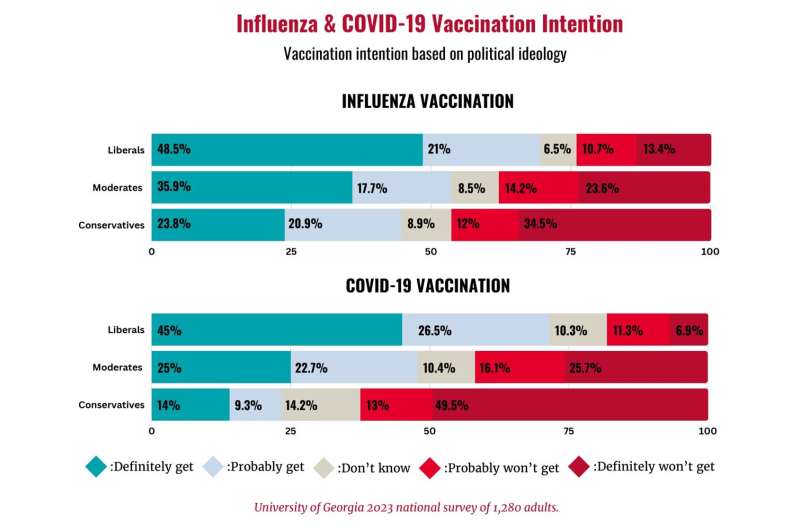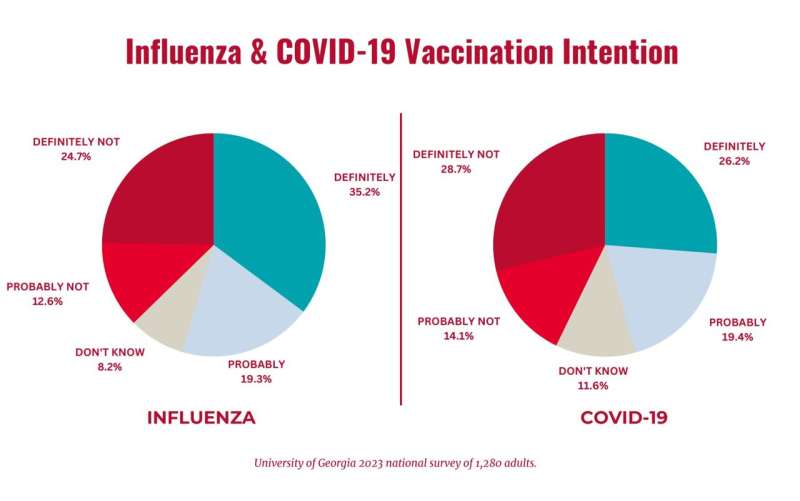This article has been reviewed according to Science X's editorial process and policies. Editors have highlighted the following attributes while ensuring the content's credibility:
fact-checked
trusted source
proofread
More adults likely to get a flu vaccination than receive an updated COVID-19 vaccine, survey finds

Fifty-five percent of U.S. adults reported that they would "definitely" or "probably" get a recommended influenza vaccination in the coming months, while 46% plan to receive an updated COVID-19 vaccine, according to findings from a national survey of 1,280 adults commissioned by the Center for Health and Risk Communication (CHRC) in the Grady College of Journalism and Mass Communication at the University of Georgia.
The percentage of adults likely to get an influenza vaccination is slightly higher than the percentage who received a flu vaccination last season. According to the Centers for Disease Control and Prevention (CDC), estimated flu vaccination coverage among U.S. adults 18 years or older in 2022-23 was 49%. Overall, the percentage of adults likely to get an updated COVID-19 vaccine mirrors the findings of a recent KFF COVID-19 Vaccine Monitor survey, which found 47% will "definitely" or "probably" get an updated COVID-19 vaccine.
"Our survey findings suggest that flu vaccination rates among all adults are returning to the level seen before the COVID pandemic," said Glen Nowak, professor and CHRC co-director, who led the survey with Michael Cacciatore, associate professor and CHRC co-director. "The return to that level is a positive sign, but it is also a reminder that a large, sustained infectious disease outbreak such as COVID-19 will not lead to increased flu vaccinations."
The survey found respondent political identification significantly influenced vaccination intentions. Seventy percent of liberal respondents intend to get a recommended flu vaccination compared to 54% for moderates and 45% for conservatives. However, political ideology had a greater impact on updated COVID-19 vaccination intentions. Seventy-two percent of liberals plan to receive an updated vaccine, compared to 48% of moderates and 23% of conservatives.
"It was not surprising there were much lower COVID-19 vaccination intentions among conservatives given findings from many surveys over the past two years," said Nowak. "However, it was surprising, and not a good development, to find so many people who are moderates and conservatives are unwilling to get a flu vaccination. All people, particularly those who are older or have health conditions that put them at higher risk for severe illness, benefit from the protection provided by flu and COVID vaccines. It is not helpful to individual or community health when trust in a medical recommendation depends on political identification."
The survey, conducted between August 2 and 22, also found that demographic factors, including age and race, were associated with influenza and COVID-19 vaccination intentions, as were diagnosed illnesses, medical conditions and receiving a recommendation from a doctor, pharmacist or health care provider.
Adults aged 55 and older were significantly more likely to get both this year's influenza vaccination and updated COVID-19 vaccine, according to the survey results.
For influenza, 62% of people aged 55 to 64, 77% of people aged 65 to 74, and 76% of people aged 75 and higher intend to receive a vaccine. Intentions to receive the updated COVID-19 vaccine were 58% for people aged 55 to 64, 63% for people aged 65 to 74, and 60% for people aged 75 and higher.
Comparatively, 44% of respondents aged 18 and 24 and just over 40% of respondents aged 25 to 34 intend to get a recommended flu vaccination, while 32% of those aged 18 and 24 and just over 31% aged 25 to 34 plan to get an updated COVID-19 vaccine.

Notably, 57% of white respondents said that they plan to get a recommended influenza vaccination, while only 44% of white respondents plan to get an updated COVID-19 vaccine.
This trend is reversed and narrowed among polled Black Americans. Just over 41% of Black respondents plan to get a recommended influenza vaccination, and 47% of Black Americans plan on getting an updated COVID-19 vaccine.
The survey also assessed flu and COVID vaccination intentions among those who currently have or have been diagnosed with at least one of seven illnesses or medical conditions: asthma, COVID-19, long COVID, diabetes, high blood pressure, influenza or being overweight.
Notably, 74% of survey respondents with diabetes plan to get a recommended influenza vaccination, while 62% of the same group said they intend to receive an updated COVID-19 vaccine. Similarly, 69% of those surveyed with high blood pressure plan to get a recommended influenza vaccination, and 56% plan to get an updated COVID-19 vaccine.
Among those who have been diagnosed with the flu, 65% plan to get a recommended influenza vaccination. Of those who have had COVID-19, 49% plan to get an updated COVID-19 vaccine. Likewise, 42% of respondents who have been diagnosed with long-COVID intend to receive an updated COVID-19 vaccine.
Fifty-eight percent of respondents who received an influenza vaccination recommendation from a doctor, pharmacist or health care provider intend to be vaccinated. Comparatively, 62% of respondents who received advice from a doctor, pharmacist or health care provider to get an updated COVID-19 vaccine intend to be vaccinated.
The survey results also found a strong connection between perceived risk and likelihood to get both vaccines. Nearly 81% of those who believed they had a high risk of being infected with influenza planned to get vaccinated. Similarly, 78% of those who believed they had a high risk of being infected with COVID-19 planned to receive an updated COVID-19 vaccine.
The survey also found that people who were in the habit of getting COVID-19 vaccinations will likely continue to do so. Of those who have already received three or more COVID-19 vaccinations, 79% plan to get an updated vaccine. Comparatively, only 3.5% of those who have never received a COVID-19 vaccination and 35% of those who received only two COVID-19 vaccinations plan to get an updated vaccine.
"Overall, our findings reaffirm that many factors are associated with getting a flu vaccination and an updated COVID vaccine," said Cacciatore. "This means there are no simple, easy or quick ways to increase vaccination among people not currently planning to get them."
More information: Survey: www.kff.org/coronavirus-covid- … itor-september-2023/



















